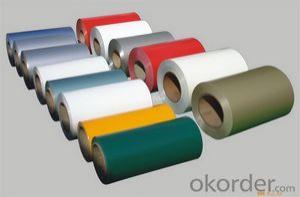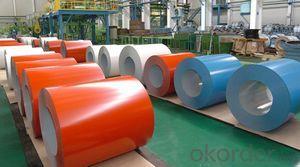AA 3003 coated aluminium coil
- Loading Port:
- China Main Port
- Payment Terms:
- TT OR LC
- Min Order Qty:
- -
- Supply Capability:
- -
OKorder Service Pledge
Quality Product, Order Online Tracking, Timely Delivery
OKorder Financial Service
Credit Rating, Credit Services, Credit Purchasing
You Might Also Like
supply Mill-finished / coated aluminum plate/sheet/ coil:
Alloy: AA1050,1060,1100,1200,2024,3003,3304,3005,3015,5052,5086,5754,5083,6061,7050,7475,8011, etc
Temper: O, H14/16/18/22/24/32/ H112/H321/T6,T851,T7451,T7351, etc
Thickness: 0.02mm—20mm
Width: 100mm—2000mm (Can be slitted)
Notice: PE coating / PVDF coating / Embossment can be done if required.
- Q:We had a BBQ a few days ago and left our pack of aluminum foil on the table out side. It rained that night and the following night. I went out to take the trash out and heard a odd noise. It was the pack of foil boiling hot. The water from the rain was steaming out of it. When I picked it up you could feel the warmth coming from the center of it.It was 2 days after the BBQ, was never near the heat of that. It was on a separate table.The table is shaded all day, so it didn't heat from the sun. Plus aluminum does not transfer heat.It just don't make since to me. I unrolled some of it and it is dark grey from being heated so hot. I never heard of it and tried to find info, but to no avail. So out of curiosity I am asking.
- Aluminium is one of the best conductors of heat so the effect may have been a rare entropic incident where the water rapidly evaporated due to the warmth of the air. What's more likely is that the aluminium was exposed to the water and the rain was slightly penetrative. Aluminium usually has aluminium oxide protection to protect against corrosion and reaction but something may have depleted that layer causing a reaction and the gas you saw steaming wasn't water but hydrogen gas.
- Q:Can aluminum coils be used in the production of kitchen utensils?
- Kitchen utensils can indeed incorporate aluminum coils in their production. Aluminum is a favored material for kitchen utensils owing to its lightweight nature, durability, and ability to conduct heat. Aluminum coils are effortlessly malleable, allowing them to take on various forms and designs for utensils like pots, pans, baking trays, and even cutlery. Moreover, aluminum possesses resistance against corrosion, making it a suitable choice for contact with food and liquids. Nevertheless, it is essential to keep in mind that aluminum utensils may require a non-stick coating or a protective layer to prevent any adverse reactions with acidic or alkaline foods. Ultimately, owing to their adaptability and practicality, aluminum coils are extensively employed in the production of kitchen utensils.
- Q:Are there any limitations on the anodizing of aluminum coils?
- Yes, there are certain limitations on the anodizing of aluminum coils. Some of the limitations include the size and thickness of the coils, as well as the surface finish and quality of the aluminum. Additionally, the composition and alloy of the aluminum can also affect the anodizing process. It is important to consider these limitations to ensure successful and satisfactory anodizing results.
- Q:Can aluminum coils be used in electrical cables?
- Yes, aluminum coils can be used in electrical cables. Aluminum is a commonly used material for electrical conductors due to its excellent electrical conductivity and relatively low cost compared to copper. It is especially used in power transmission and distribution cables where long-distance transmission is required. Aluminum coils are often used in overhead power lines and underground cables. However, it is important to note that aluminum has a lower tensile strength than copper, so the cables need to be properly designed and manufactured to ensure adequate mechanical strength. Additionally, aluminum conductors require larger cross-sectional areas compared to copper to achieve the same electrical performance, which can result in slightly larger cable sizes.
- Q:Can kerosene lubricate and cool aluminum coil when continuous punch?
- Yes, because water and oil are not solute, but they will emulsificate.
- Q:How do aluminum coils contribute to sustainable and green building practices?
- Aluminum coils play a vital role in promoting sustainable and environmentally friendly building practices due to the numerous benefits they offer. Let's explore how these coils contribute to such practices: 1. Enhancing energy efficiency: The lightweight nature and exceptional thermal conductivity of aluminum coils make them ideal for insulation purposes. When incorporated into the building's envelope, these coils effectively minimize heat transfer, thereby increasing energy efficiency. Consequently, this reduces the need for excessive heating or cooling, leading to lower energy consumption and fewer greenhouse gas emissions. 2. Ensuring longevity and durability: Aluminum possesses high resistance to corrosion and has a longer lifespan compared to other materials. This durability significantly decreases the need for frequent replacements, which can have a substantial environmental impact. By utilizing aluminum coils in construction, we can reduce waste and effectively conserve resources. 3. Emphasizing recyclability: Aluminum stands out as one of the most recyclable materials available, boasting a high recycling rate. When aluminum coils reach the end of their life cycle, they can be effortlessly recycled and transformed into new products without any loss in quality. By opting for aluminum coils, we actively support a closed-loop recycling system, reducing the demand for virgin materials and minimizing waste. 4. Minimizing carbon footprint: Aluminum production requires significantly less energy compared to metals like steel or copper. This lower energy consumption leads to a reduced carbon footprint during the manufacturing process. Furthermore, using recycled aluminum in coil production requires even less energy, making it an even more sustainable choice. 5. Harnessing reflectivity: Aluminum possesses high reflectivity, allowing it to deflect sunlight and heat away from the building. This characteristic assists in reducing cooling loads, especially in hot climates, thereby reducing the energy required for air conditioning. By incorporating aluminum coils into roofing or cladding, buildings can mitigate their impact on local microclimates and decrease the urban heat island effect. Altogether, aluminum coils actively contribute to sustainable and eco-friendly building practices by promoting energy efficiency, durability, recyclability, and reducing the carbon footprint. By selecting aluminum as a construction material, we can foster greener buildings that conserve resources, minimize waste, and have a lesser environmental impact.
- Q:So on friday we mixed crystaline copper chloride stuffs with water to make a clear blue solution. We then put some aluminum into the solution. The solution began to heat up and there was a redish brown precipitate at the end. What caused the heat? What was boiling? How does the mass of the original aluminum and original copper chloride crystaline stuff compare with the mass of the red/brown power stuff (we strained the liquid out), and the mass of the dried up blue stuff?
- RE: Copper (II) Chloride Aluminum Lab! ? on a similar time as observing the filtrate of this lab, it incredibly is the Aluminum Chloride, what surely observations must be made approximately it? additionally, as quickly as you first pour the Copper (II) Chloride crystals into the water, is it heterogeneous or homogeneous? How approximately in case you enable the beaker sit down undisturbed for some...
- Q:Can aluminum coils be painted?
- Yes, aluminum coils can be painted. However, it is important to follow proper surface preparation and use a suitable paint that is compatible with aluminum to ensure a long-lasting and durable finish.
- Q:What is the role of aluminum coils in the construction of power plants?
- Aluminum coils are commonly used in power plants for the construction of heat exchangers and condensers. These coils play a crucial role in facilitating the transfer of heat and efficiently cooling fluids within the power plant system. The lightweight and corrosion-resistant nature of aluminum makes it an ideal material choice for these applications, ensuring optimal performance and longevity of the power plant equipment.
- Q:Can aluminum coils be used in corrosive gas environments?
- Yes, aluminum coils can be used in corrosive gas environments. Aluminum is known for its excellent corrosion resistance, especially in atmospheric conditions. It forms a protective oxide layer on the surface that protects the metal from further corrosion. However, it is important to note that aluminum can be susceptible to certain corrosive gases, such as chloride and sulfur compounds. In such cases, additional protective measures, such as surface treatment or coating, may be necessary to ensure the longevity and performance of the aluminum coils in corrosive gas environments.
1. Manufacturer Overview |
|
|---|---|
| Location | |
| Year Established | |
| Annual Output Value | |
| Main Markets | |
| Company Certifications | |
2. Manufacturer Certificates |
|
|---|---|
| a) Certification Name | |
| Range | |
| Reference | |
| Validity Period | |
3. Manufacturer Capability |
|
|---|---|
| a)Trade Capacity | |
| Nearest Port | |
| Export Percentage | |
| No.of Employees in Trade Department | |
| Language Spoken: | |
| b)Factory Information | |
| Factory Size: | |
| No. of Production Lines | |
| Contract Manufacturing | |
| Product Price Range | |
Send your message to us
AA 3003 coated aluminium coil
- Loading Port:
- China Main Port
- Payment Terms:
- TT OR LC
- Min Order Qty:
- -
- Supply Capability:
- -
OKorder Service Pledge
Quality Product, Order Online Tracking, Timely Delivery
OKorder Financial Service
Credit Rating, Credit Services, Credit Purchasing
Similar products
New products
Hot products
Related keywords






























